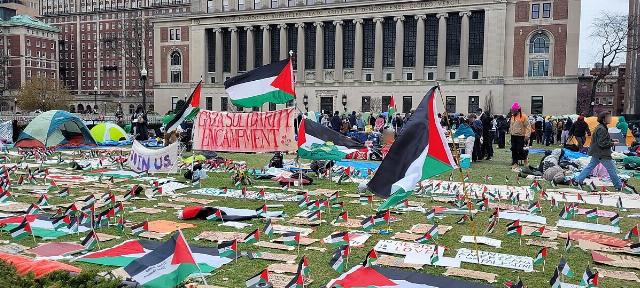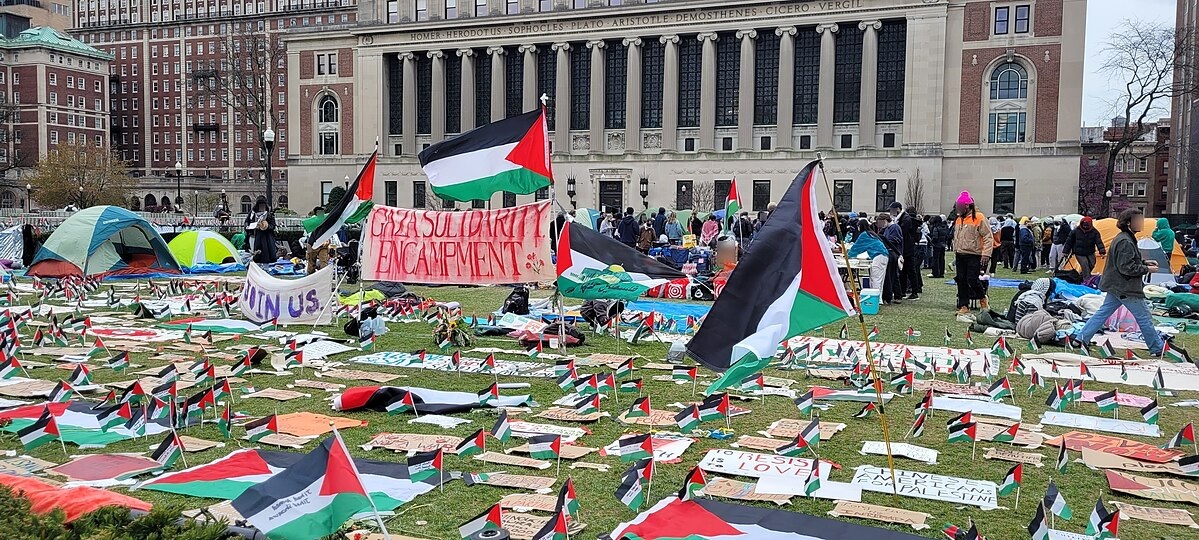

Photo Credit:From wiki
عباد ديرانية
How does television do in dealing with the Gaza protests and anti-Semitism?After the Hollywood strikes pushed back the 2023-2024 TV season, NBC’s Law and Order devoted the first possible episode (1-18-24) to the spread of anti-Israel university protests following the horrific October 7, 2023 attack on Israel by Hamas terrorists.
Here, fictional Hudson University in New York is rocked by demonstrations during which vandals mark an X on a “Stand With Israel” Oct. 7 poster. University President Nathan Alpert tries to stop vandals and is assaulted.
His wife hears the brutal attack over a cell phone. He is found dead with a “Traitor” sign on his body and two knife wounds to his chest. His wife tells the detectives that he had been “under a microscope,” with “so many pressures about what to say, what not to say.”
Activist pro-Israel professor Phillip Klein (Jason Babinsky) says that he is glad that Alpert is dead. Klein had been slapped with a restraining order after tearing down “From the River to the Sea” signs and wonders whether he will go to prison for fighting anti-Semitism: “A college campus is a place to debate, to express opinions, but not here, not these days. You express the wrong view, you’re cancelled, unless of course you’re talking about Israel. On that topic you say what you want, the more hateful the better.”
Klein had threatened to kill Alpert, but explains that he was upset by the October 7 attacks, and by Alpert’s refusal to issue a statement against Hamas.
It is interesting that writers Rick Eid and Pamela Wechsler (producer Dick Wolf and Eid being credited with “story”), decided that the Israel-supporter had to be unhinged and, worse(?), politically incorrect. In fact, Klein “progressively” becomes more deranged. He guns down university student Chloe Esper, a social influencer with 13 million followers, whose mother was born in Gaza.
But President Alpert, it turns out, was murdered by a student with no Muslim or Middle Eastern ties who, according to Chloe’s boyfriend, was “brainwashed” along with many other students by Professor Kendra Nasser, who is “hard core” in her “extreme pro-Palestinian propaganda.” Clearly intended to be a voice of reason, Chloe’s boyfriend says of Nasser: “She thought Oct. 7 was justified. I support innocent Palestinians, but come on. It was a flat out act of terror.”
The episode’s trial scenes deal with the fascinating question: Can a professor be tried for manipulation and indoctrination that leads to violence? The writers push the envelope by having the professor explicitly suggest to a male student that he kill the university president, even providing the knife. The question is valid, but the scenario offers front stage to the professor: “If students decide to take actions based… on these facts, based on their own moral constitutions, there’s nothing I can do. He told me what he had done after the fact, and I was proud of him.”
Obviously, the writers wanted to present “both sides.” Anti-Semitic outbursts and threats to Jewish students are noted.
Professor Klein, for his part, was set off when he learned that his college roommate was murdered with his entire family by Palestinians. The episode concludes with the image not of brainwashing ideologue professors, but of a wokeness-rejecting Jewish professor now totally unhinged to the point of suicide by cop. The manipulated student and the manipulating professor are made to look “rational” in their crimes.
<img alt="From wiki" captext="عباد ديرانية” class=”post-image-right” src=”https://conservativenewsbriefing.com/wp-content/uploads/2025/01/gaza-israel-and-entertainment.jpg” width=”450″>Not that the franchise cannot stick to the theme of dangerous ideologue professors. In its FBI series (3-26-24), a professor also radicalizes students, doling out the poison ricin from her laboratory for campus eco-organization members to murder lobbyists and other advocates of fossil fuel. Seeking to target more of her “enemies,” she seeks to have the ricin released by sprinklers at a large gathering. Apparently, professors in the sciences can be as dangerous as professors in the political sciences, though murder by science is far less roundabout.
I waited to see whether these shows would take up again the war in Israel and Gaza.
About a year after the first episode, Law and Order writer Wechsler addressed the theme once more. (11-14-24) A journalism professor at Hudson, Charles Bennett, stands up for the protesters at Hudson and is later found murdered at his home.
The housekeeper tells detectives that not long before, the front window was smashed and an Israeli flag taken. A suspect in that incident sounds off: “Put an Israeli flag in your window and you have to expect that people are going to react. It’s a symbol of hate.” The detective responds, “Or it’s a sign that you recognize Israel’s right to exist, and that you support the innocent people who were slaughtered on October 7.” and then asks: “There’s only one way to look at something like this?” The suspect gets the last word: “Sometimes, yes. This is one of those times. His wife, that judge, couldn’t go ten minutes without spouting her pro-Israel propaganda.”
The investigation quickly pivots to the “wife, that judge” (Michaela Watkins) even during her husband’s big funeral at a prestigious synagogue. Was her husband killed because of some of her rulings against dangerous criminals? Had she sometimes gotten violent with her husband, as his brother quoted the professor as saying? Was this because of differing political views?
It turns out that indeed the professor was killed because of something his wife did in her capacity as judge. She had withdrawn an offer to a law school student to clerk because he was involved in anti-Israel encampments. She remains adamant that she had the right to reject him for that reason.
Arrested in his tent the student-defendant pipes up in his first court appearance: “I believe I’m being targeted because I’m an activist who has spoken out in behalf of the Palestinian people.”
The victim’s wife, the judge, refuses to testify that she revoked the defendant’s job offer. It is then revealed that she is petrified that her addiction to opioid, the result of a ski accident, might come to light if she is called to the stand. She says that her career is all she has left after her husband was killed.
The D.A. serves her with a subpoena, but the mayor talks him into “seeing the big picture”: namely, that if news of her addiction comes to light, the public would be endangered should her cases involving terrorists, drug traffickers, and child pornographers be overturned.
What emerges from these episodes is the image of a pro-Israel professor and a pro-Israel judge as out-of-control people, one angry and one desperate, and a lot of rhetoric about Jewish control, genocide, and propaganda-spouting. Where is the “balance” after all, and which rhetoric is given more voice?
Image: عباد ديرانية





